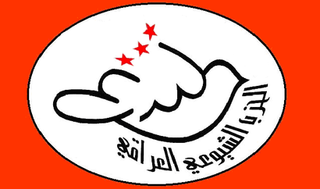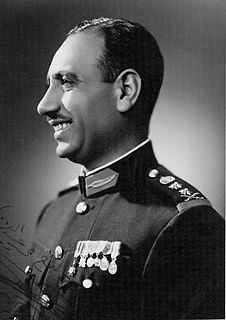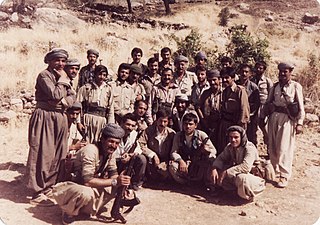Leninist Group in the Iraqi Communist Movement (Arabic : الفريق اللينيني في الحركة الشيوعية العراقية) was a grouping of Iraqi communist exiles, dissidents from the Iraqi Communist Party. The main leaders of the group were two university professors at the University of Algiers, Khalid Abdullah as-Salam and Khalil al-Jazairi. Towards the late 1980s, the group began issuing a broadsheet publication, Nashrah. [1]

Iraq, officially the Republic of Iraq, is a country in Western Asia, bordered by Turkey to the north, Iran to the east, Kuwait to the southeast, Saudi Arabia to the south, Jordan to the southwest and Syria to the west. The capital, and largest city, is Baghdad. Iraq is home to diverse ethnic groups including Arabs, Kurds, Assyrians, Turkmen, Shabakis, Yazidis, Armenians, Mandeans, Circassians and Kawliya. Around 95% of the country's 37 million citizens are Muslims, with Christianity, Yarsan, Yezidism and Mandeanism also present. The official languages of Iraq are Arabic and Kurdish.

The Iraqi Communist Party is a communist party and the oldest active party in Iraq. Since its foundation in 1934, it has dominated the left in Iraqi politics. It played a prominent role in shaping the political history of Iraq between its foundation and the 1970s. The Party was involved in many of the most important national uprisings and demonstrations of the 1940s and 1950s. It suffered heavily under the Ba'ath Party and Saddam Hussein but remained an important element of the Iraqi opposition and was a vocal opponent of the United Nations sanctions imposed on Iraq after the Gulf War of 1991. It opposed the United States invasion of Iraq in 2003 but since then has participated in the new political institutions. It received little support in the Iraqi general elections of 2005. The party reportedly gained some seats in each province in which the 2013 Iraqi governorate elections were held. The party joined the newly established Sairoun Alliance in the 2018 parliamentary elections, who gained the highest number of votes and a total of 54 seats in the Iraqi parliament. A communist woman representing the alliance, Suhad al-Khateeb, was also elected in the elections to represent the city of Najaf, deemed to be one of the holiest religious and conservative cities in Iraq. Al-Khateeb, who is a teacher and an anti-poverty and women's rights activist, said upon her victory "the Communist party have a long history of honesty – we were not agents for foreign occupations. We want social justice, citizenship, and are against sectarianism, and this is also what Iraqis want."
The group signed an appeal of leftist and democratic exiles in the Baathist newspaper at-Thawra in December 1991. In the wake of the 1991 war, the Iraqi government issued a pardon for Iraqi exiles. As-Salam and al-Jazairi both returned to Iraq. [1]

The Arab Socialist Ba'ath Party was a political party founded in Syria by Michel Aflaq, Salah al-Din al-Bitar, and associates of Zaki al-Arsuzi. The party espoused Ba'athism, which is an ideology mixing Arab nationalist, pan-Arabism, Arab socialist, and anti-imperialist interests. Ba'athism calls for unification of the Arab world into a single state. Its motto, "Unity, Liberty, Socialism", refers to Arab unity, and freedom from non-Arab control and interference.

Al-Thawra, also referred to as Ath-Thawra, is an Arabic language newspaper published by the Arab Socialist Ba'ath Party of Syria. Another newspaper with the same name was published by the Arab Socialist Ba'ath Party of Iraq but was disbanded during the invasion of Iraq in 2003 by the UK and the USA armies.

The Gulf War, codenamed Operation Desert Shield for operations leading to the buildup of troops and defense of Saudi Arabia and Operation Desert Storm in its combat phase, was a war waged by coalition forces from 35 nations led by the United States against Iraq in response to Iraq's invasion and annexation of Kuwait arising from oil pricing and production disputes. The war is also known under other names, such as the Persian Gulf War, First Gulf War, Gulf War I, Kuwait War, First Iraq War or Iraq War, before the term "Iraq War" became identified instead with the 2003 Iraq War.







